- Santa Monica College strives to create a learning environment that both challenges our students and supports them in achieving their educational goals. We prepare our students to contribute to the global community as they develop an understanding of their personal relationship to the world’s social, cultural, political, economic, technological, and natural environments.
School Highlights
Santa Monica College serves 32,856 students (30% of students are full-time).
The college's student:teacher ratio of 27:1 is lower than the state community college average of 32:1.
Minority enrollment is 73% of the student body (majority Hispanic), which is less than the state average of 77%.
Quick Stats (2025)
- Enrollment: 32,856 students
- In-state tuition: $1,176
- Out-state tuition: $7,836
- Student:teacher ratio: 27:1
- Minority enrollment: 73%
- Source: Integrated Postsecondary Education Data System (IPEDS)
Top Rankings
Santa Monica College ranks among the top 20% of public schools in California for:
Category
Attribute
Diversity
Community Size
Debt For Students
School Overview
The teacher population of 1,229 teachers has stayed relatively flat over five years.
Santa Monica College
(CA) Community College Avg.
Carnegie Classification
Baccalaureate/Associate's Colleges: Associate's Dominant
Baccalaureate/Associate's Colleges: Associate's Dominant
Institution Level
Four or more years
At least 2 but less than 4 years
Institution Control
Public
Public
Total Faculty
1,229 staff
294 staff
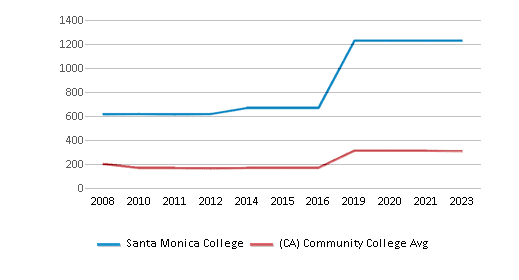
School Calendar
Student Body
The student population of Santa Monica College has grown by 19% over five years.
The student:teacher ratio of 27:1 has increased from 21:1 over five years.
The Santa Monica College diversity score of 0.75 is more than the state average of 0.70. The school's diversity has stayed relatively flat over five years.
Total Enrollment
32,856 students
2,311 students
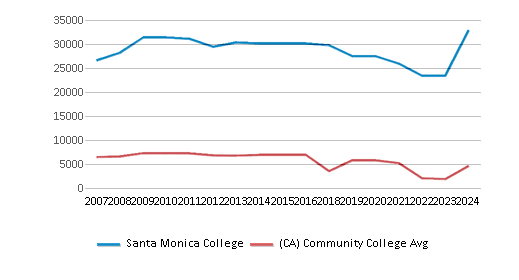
Student : Teacher Ratio
27:1
32:1
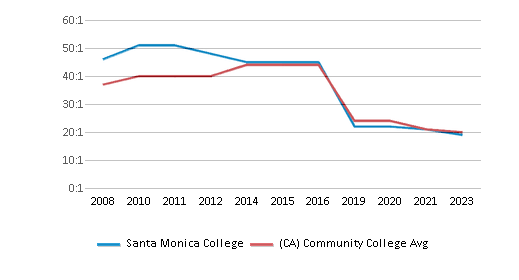
# Full-Time Students
9,790 students
1,232 students
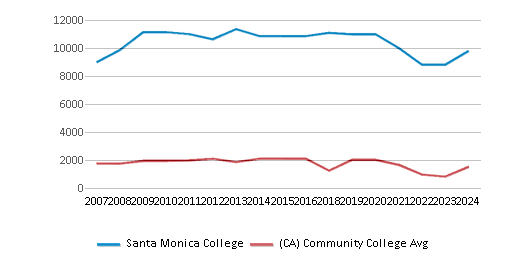
# Part-Time Students
23,066 students
8,299 students
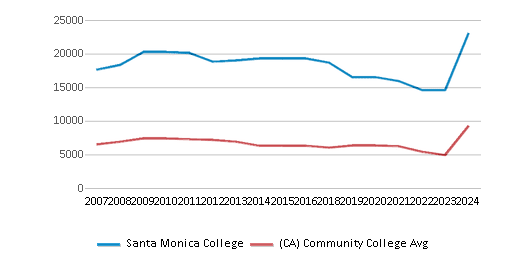
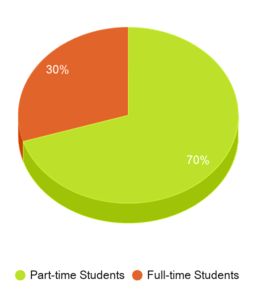
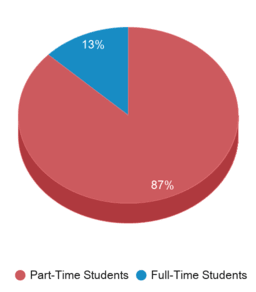
# Enrollment Undergraduate
328 students
240 students
# Full-Time Undergraduate Students
9,790 students
1,155 students
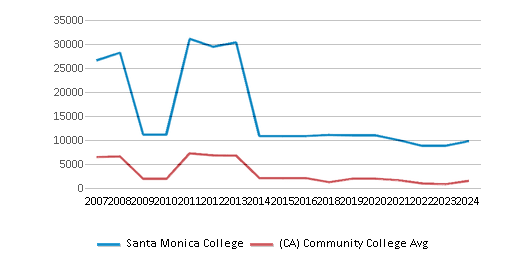
# Full-Time Graduate Students
n/a
63 students
# Part-Time Undergraduate Students
23,066 students
8,457 students
# Part-Time Graduate Students
n/a
10 students
Total Dormitory Capacity
n/a
140 students
% American Indian/Alaskan
n/a
n/a
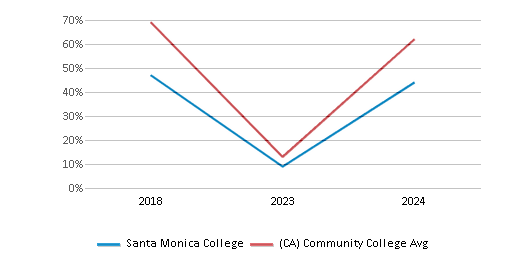
% Asian
10%
13%
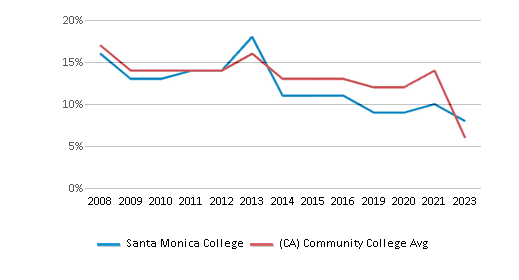
% Hispanic
39%
47%
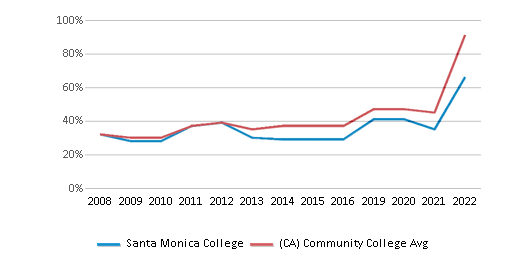
% Black
9%
7%
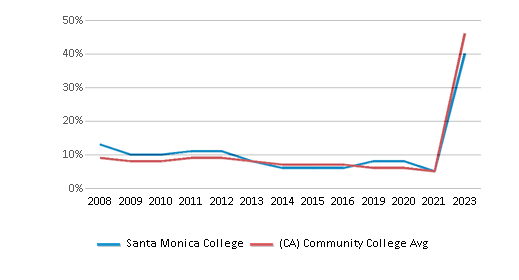
% White
27%
23%
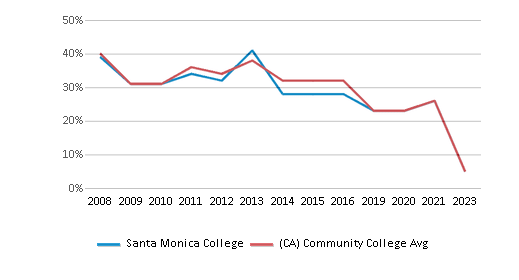
% Hawaiian
n/a
1%
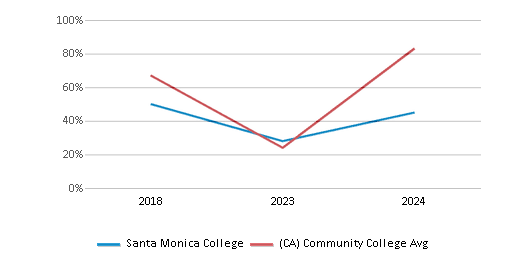
% Two or more races
6%
5%
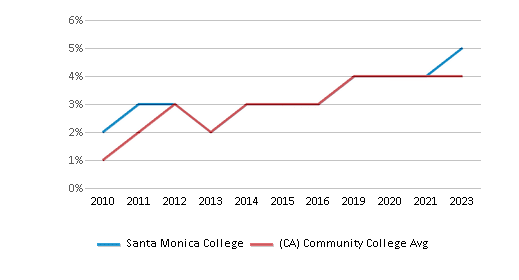
% Non Resident races
6%
1%
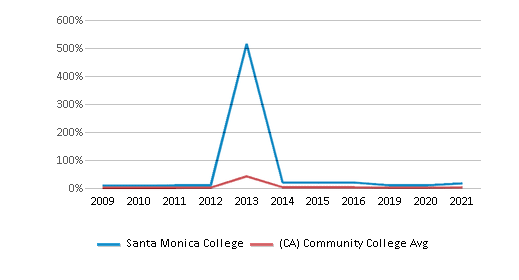
% Unknown races
3%
3%
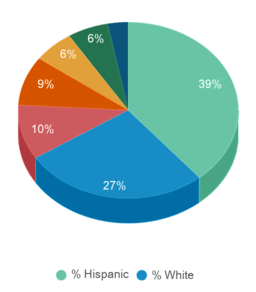
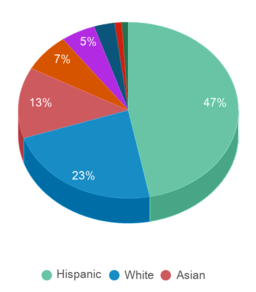
Diversity Score
0.75
0.70
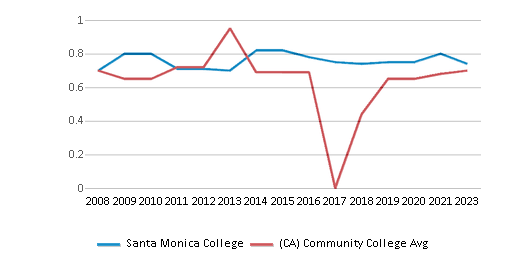
College Completion Rate (Students who graduate in less than 4 years)
30%
28%
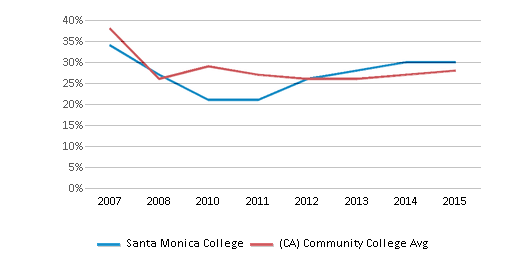
College Completion Rate (Students who graduate in 4 years or more than 4 years)
0.3223%
0.4304%
Average Graduate Earnings (10 Years)
$38,100
$34,700
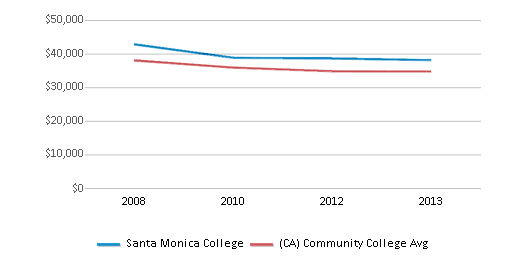
Tuition and Acceptance Rate
The public in-state tuition of $1,176 is less than the state average of $1,236. The in-state tuition has stayed relatively flat over four years.
The public out-state tuition of $7,836 is more than the state average of $6,547. The out-state tuition has declined by 13% over four years.
In-State Tuition Fees
$1,176
$1,236
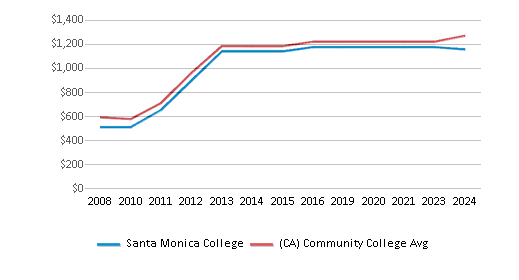
Out-State Tuition Fees
$7,836
$6,547
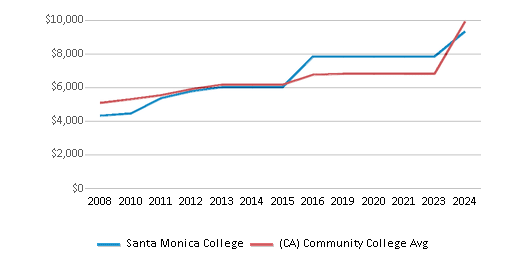
% Students Receiving Some Financial Aid
72%
85%
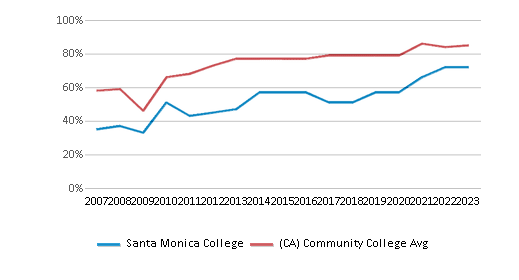
Median Debt for Graduates
$6,750
$10,500
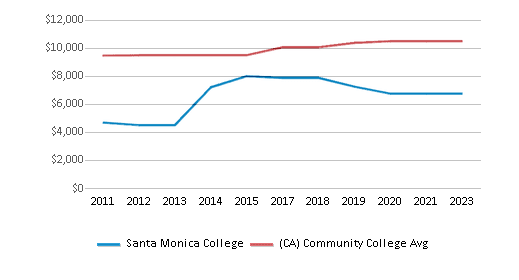
Median Debt for Dropouts
$5,500
$6,239
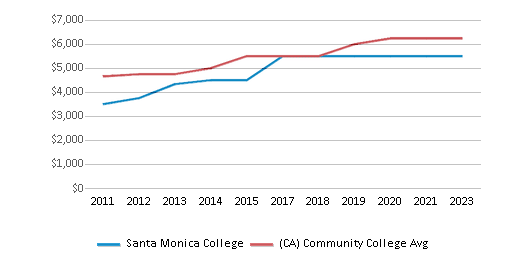
Acceptance Rate
n/a
92%
Source: 2024 (or latest year available) Integrated Postsecondary Education Data System (IPEDS) , School Administrators
School Notes
- To fulfill this mission, the College provides open and affordable access to excellent associate degree and occupational certificate programs. These programs prepare students for successful careers, develop college-level skills, enable transfer to universities, and foster a personal commitment to lifelong learning. We have an impressive academic record. We are the leader among the state's 108 community colleges in transferring students to the University of California , University of Southern California and other four-year campuses. We also pride ourselves on preparing students for careers of the 21st century – in such fields as nursing, computer applications, early childhood education, business, accounting, graphic design and other occupations. Set on a 38-acre main campus less than two miles from the beach, Santa Monica College has everything today's student needs to succeed – computer labs, athletic facilities, performing and visual arts spaces, and active student clubs. The SMC Library underwent a $23.6 million expansion and modernization and reopened in August 2003 as a state-of-the-art, architecturally praised facility. Our Science Complex, which opened in fall 1999, features the latest in equipment and high-tech labs. Our award-winning faculty works closely with students to ensure their success, and we have numerous student services to help students meet their goals. Santa Monica College – a two-year community college accredited by the Western Association of Schools and Colleges – opened in 1929 with just 153 students. It has now grown to a thriving campus with 25,000 students and offerings in more than 80 fields of study.
Frequently Asked Questions
How much does Santa Monica College cost?
Santa Monica College's tuition is approximately $1,176 for In-State students and $7,836 for Out-State students.
What is Santa Monica College's ranking?
Santa Monica College ranks among the top 20% of community college in California for: Diversity in US community colleges, Largest student body and Least debt for graduating students.
In what neighborhood is Santa Monica College located?
Santa Monica College is located in the Sunset Park neighborhood of Santa Monica, CA.
Recent Articles

Obtaining Your Bachelor's Degree at a Community College
Explore the evolving landscape of community colleges offering bachelor's degrees, addressing affordability, accessibility, and workforce needs.

A to Z of Community College Certificates and Courses
From business and healthcare to technology and skilled trades, the article showcases the breadth of options available to students seeking to enhance their knowledge, develop new skills, or pursue career advancement.

What is a Community College?
This comprehensive guide explains what a community college is, its history, and its role in higher education. It covers the types of programs offered, differences from four-year colleges, benefits of attending, and important considerations for prospective students, providing valuable insights for those exploring educational options.













